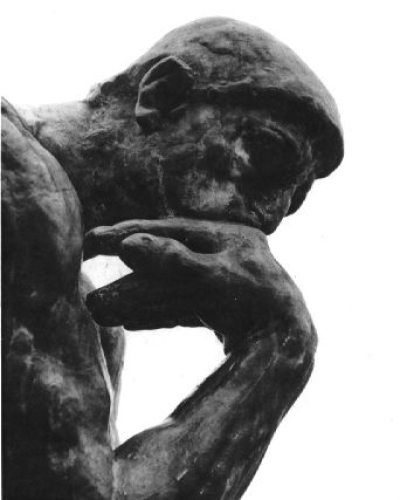It’s so easy to get lost in the same loop of our thoughts, truly believing that what we think is our own true perception of life. But how certain can we be that these are fundamentally our own thoughts? Are they not merely an amalgamation of other people’s opinions that we subconsciously decided to piece together to make it solely our own?

They might even be fragments and echoes of other people that we found ourselves admiring and yearned to be. It leads us to beg the question: how do we truly know if our thoughts are our own? Independent thinking can be defined as using your own personal observations to process and determine the veracity of information without being swayed by other people’s opinions and thoughts. In other words, not allowing external sources to influence your internal beliefs. Most successful individuals are deemed as independent thinkers and owe their success to their capabilities of thinking this way. They are non-conformists, and fear comfort as they dare to defy normalcy. Thinking independently is exactly what aided them in their quest for success; it provided them with the means to come up with new solutions and ways to overcome their problems. Independent thinking is a trait that we usually admire in leaders and tend to flock towards, as it is a sign of intellect and self-assuredness. Contrary to popular belief, people are not merely born with the ability to think independently, it is the product of a lifetime of constantly trying to better themselves. Truth be told, we all have the ability to break out of our old thought cycles and adopt a new way of thinking. Hence, this article will be shedding light on why we might not be independent thinkers and how we can work towards becoming one.
Identifying the problem

1. Regimented Educational Systems
As many of us have been subjected to educational systems that are regimented by specific structures, it is hard for us to even begin to imagine how to think independently. This is because most of the information and knowledge that we’ve received was filtered beforehand, and thus we would mainly learn the same belief that we were supposed to internalise as our own. In other words, we were placed in a system where each of our thoughts were molded to be the same and straying away from the rigidity of the predefined answers would only reward you with a big red “X”. This exact system wired our mindsets into believing that thinking ambiguously is somehow overstepping our mental boundaries. Imbibing ourselves with other people’s philosophies was regarded as a landmark of intelligence and of thinking outside of the box. But in reality, all this led us to do is to become an echo of someone else’s voice and quietly undermine the value of our own perceptions. So, the next time you decide to quote someone else’s words, you should ask yourself if they truly align with your own beliefs or if they are merely thoughts that society pushed you into believing.

2. Societal Pressure
This leads us to the next source of the problem: the pressure that society places on conformation. Possessing a common belief within society often means that those who think differently are shamed and harassed for doing so. This is especially detrimental to our thought processes as we are inherently drawn towards fitting into social groups. You are automatically coerced into adopting a herd mentality for the mere sake of “unity”. However, many fail to realise that defiance is not necessarily an act of rebellion aimed at causing disorder, it can be for the advancement of edification as well. Sometimes, defiance is mainly just acknowledging your innermost philosophies and that is the case with independent thinking: moments will arise where you may have to object to the general current of thoughts. In no way is this harmful to the overall societal harmony provided that your beliefs do not infringe upon the rights of others. On the contrary, it encourages diversity and can open up room for new discussions to better our systems.
How can you work towards being an independent thinker?
Fear not, for as daunting as it may seem to be able to work towards thinking independently, it is not an impossible feat. However, it does require continuous effort so that you may cultivate your mind into changing its cognitive processes and identifying the ways that you may easily be swayed by others. Here are some methods that I find that work for me:

1. Reading critically
Critical thinking is a term that we always hear being tossed around as a fundamental skill that should be strived towards, if you wish to better yourself in terms of forming your own opinions and analysing information. However, I think the skill that we should be focusing on more is critical reading. Though critical thinking is undeniably a vital skill, it requires prior knowledge that we can fall back on to come up with alternative thoughts and this can prove to be a major challenge to individuals, especially youths and students who do not know as much as their older counterparts. Hence, critical reading is an easier method to start off your journey into thinking independently as it relies mainly on information that you are given and that you have in front of you. The whole point of reading critically is to be able to manifest your own capability to form an opinion without relying solely on the given text. It is also perfectly alright if you disagree with the reading material because not all that is written is the absolute truth. Why this is so important is because it enables us to identify certain loopholes or writing techniques that are used to manipulate its audience.

2. Questioning Facts
Many of us have habituated ourselves into merely accepting facts that we read, especially if they are attached to data and evidence in the form of statistics, because we have been conditioned into affirming that this means it is not only reliable, but it is convincing. However, facts can be wrong, and you might actually be the first to debunk something that is generally accepted. I believe that it is important to question facts because it is a gateway to comprehending more on a subject and acknowledges that facts are also prone to human error. After all, if we don’t question what is deemed as accurate, we will never learn more than what we have been provided with. Hence, we should build on already founded facts so that it can facilitate our own progression and advancement. Questioning facts enables you to discover the reasoning and justification behind its formulation so that you may use your own rationality and logic to decide for yourself whether you choose to believe in it or not. This is especially essential in this current age where information is readily flowing through and innumerable pieces of false information are widely spread as the truth. Identifying the holes in such information prevents yourself from being easily fooled into believing falsehoods.

3. Having Intellectual Discussions
Gaining new perspectives from others actually helps you to become an independent thinker as it enables you to compile many insights on certain matters and determine your own stand on the matter. Hearing and accepting other people’s opposing opinions can seem like an obstacle but it is actually an optimum way of challenging your own mental boundaries and can inspire you to exercise freedom of thought as well. It actually opens up room for further discussions that you might not have thought about, which can benefit both parties as it expands the horizons of your thoughts. However, it is also vital to remember that intellectual discussions do not mean compromising or relenting your perceptions to reach a mutual and unified opinion, but rather an open and non-judgemental environment where you can express and interexchange your thoughts for a broader view on the world. Engaging in such discussions will definitely contribute to your own personal growth as it challenges your ideals and ensures that you do not live in the comfort of your own thoughts. Second-guessing your beliefs is essential to success as it is a sign of growth and adapting to maturity.
However, I believe that being wholly an independent thinker is unattainable but endeavouring to have certain independent thoughts is a more realistic approach. This is owing to the fact that there is no possible method of stripping away the variables that influence the assimilation of our thoughts without isolating ourselves entirely from society and its modernisations. Even then, our thoughts would still be a product of our childhood upbringing and there would still be a remnant of external influence over our life. Even if we take a look at ourselves right now and assume that we have free reign over our thoughts and are exercising independent thinking just because our perceptions are different from those that surround us, we would still be wrong. These thoughts will have emerged due to things that we have read or heard outside of our physical reach. They are not our own, but rather other people’s thoughts that we have decided to retain. The most important aspect that we should be taking away from this way of thinking is to aspire to have major control over our beliefs and to disassociate ourselves from submissiveness.
On a final note, I will leave you all with a particularly thought provoking quote from one of my favourite novels, 1984 by George Orwell, that really makes me question the blurring lines between acquiring knowledge and unknowingly accepting manipulation: “For, after all, how do we know that two and two make four? Or that the force of gravity works? Or that the past is unchangeable? If both the past and the external world exist only in the mind, and if the mind itself is controllable – what then?”
By: Julia Rosalyn



